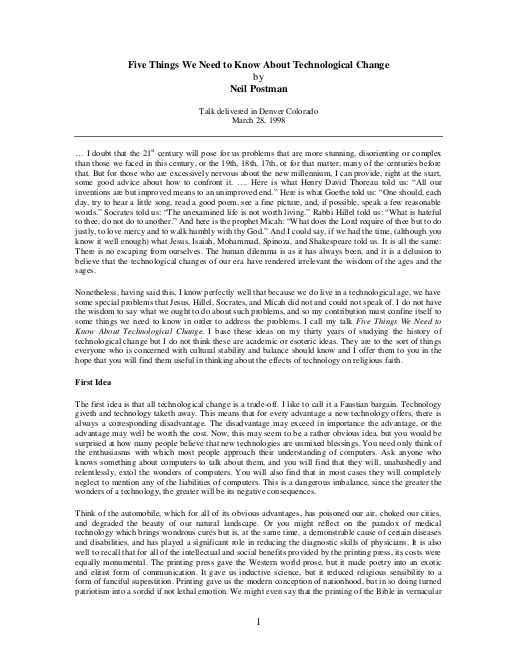Neil Postman - Five things we need to know about technological change Read in August 2018

Five ideas from 1998 to help us "proceed with our eyes wide open so that we many use technology rather than be used by it".
It is foolish to believe technology makes moot our human predicament and supersedes long-acquired wisdom. "There is no escaping from ourselves".
1. All technological change is a trade-off / culture always pays a price for technology
There is no free lunch; "for every advantage a new technology offers, there is always a corresponding disadvantage. The disadvantage may exceed in importance the advantage, or the advantage may well be worth the cost".
Proponents of a technology will easily praise it unequivocally, showing benefits and ignoring the costs.
Examples of technology with associated negative consequences:
- Automobile: air poisoning, city remodeling, landscape degradation.
- Medical tech: causes diseases as side-effect, reduces diagnostic skills of physicians.
- Printing press: made poetry elitist, reduced religious sensibility to superstition.
The question “What will a new technology do?” is no more important than the question, “What will a new technology undo?” Indeed, the latter question is more important, precisely because it is asked so infrequently.
2. Advantages & disadvantages of new technologies are never distributed evenly among the population / every new technology benefits some and harms others
When seeing a new technology being born, we should ask ourselves who will benefit from its development: which groups, type of persons, industries? And which will be harmed.
Coming back to computers, I have to quote this piece of text explicitly, which, written in 1998 and read in the light of 2018 Facebook & Google privacy scandals, abuse of power, and election manipulation, is amazingly prescient:
There is no doubt that the computer has been and will continue to be advantageous to large-scale organizations like the military or airline companies or banks or tax collecting institutions. And it is equally clear that the computer is now indispensable to high-level researchers in physics and other natural sciences.
But to what extent has computer technology been an advantage to the masses of people? To steel workers, vegetable store owners, automobile mechanics, musicians, bakers, bricklayers, dentists, yes, theologians, and most of the rest into whose lives the computer now intrudes? These people have had their private matters made more accessible to powerful institutions. They are more easily tracked and controlled; they are subjected to more examinations, and are increasingly mystified by the decisions made about them. They are more than ever reduced to mere numerical objects. They are being buried by junk mail. They are easy targets for advertising agencies and political institutions.
More direct quoting of already dense prose on our collective debilitation-by-tech:
In a word, these people are losers in the great computer revolution. The winners, which include among others computer companies, multi-national corporations and the nation state, will, of course, encourage the losers to be enthusiastic about computer technology. That is the way of winners, and so in the beginning they told the losers that with personal computers the average person can balance a checkbook more neatly, keep better track of recipes, and make more logical shopping lists. Then they told them that computers will make it possible to vote at home, shop at home, get all the entertainment they wish at home, and thus make community life unnecessary.
And now, of course, the winners speak constantly of the Age of Information, always implying that the more information we have, the better we will be in solving significant problems— not only personal ones but large-scale social problems, as well. But how true is this? If there are children starving in the world—and there are—it is not because of insufficient information. We have known for a long time how to produce enough food to feed every child on the planet. How is it that we let so many of them starve? If there is violence on our streets, it is not because we have insufficient information. If women are abused, if divorce and pornography and mental illness are increasing, none of it has anything to do with insufficient information. I dare say it is because something else is missing, and I don’t think I have to tell this audience what it is. Who knows?
This age of information may turn out to be a curse if we are blinded by it so that we cannot see truly where our problems lie. That is why it is always necessary for us to ask of those who speak enthusiastically of computer technology, why do you do this? What interests do you represent? To whom are you hoping to give power? From whom will you be withholding power?
3. Embedded in every technology lies one or a few powerful ideas
And these ideas will act as lenses, as biases.
Cultures without writing value human memory. Once writing enters in the picture, organization and analysis then become what's valuable. Comes the telegraph and speed becomes tantamount. Television emphasizes immediacy over the historical perspective of a book. Etc.
The third idea, then, is that every technology has a philosophy which is given expression in how the technology makes people use their minds, in what it makes us do with our bodies, in how it codifies the world, in which of our senses it amplifies, in which of our emotional and intellectual tendencies it disregards. This idea is the sum and substance of what the great Catholic prophet, Marshall McLuhan meant when he coined the famous sentence, “The medium is the message”.
4. Technological change is not additive; it is ecological.
What happens if we place a drop of red dye into a beaker of clear water? Do we have clear water plus a spot of red dye? Obviously not. We have a new coloration to every molecule of water. That is what I mean by ecological change. A new medium does not add something; it changes everything. In the year 1500, after the printing press was invented, you did not have old Europe plus the printing press. You had a different Europe. After television, America was not America plus television. Television gave a new coloration to every political campaign, to every home, to every school, to every church, to every industry, and so on.
That is why we must be cautious about technological innovation. The consequences of technological change are always vast, often unpredictable and largely irreversible. That is also why we must be suspicious of capitalists. Capitalists are by definition not only personal risk takers but, more to the point, cultural risk takers. The most creative and daring of them hope to exploit new technologies to the fullest, and do not much care what traditions are overthrown in the process or whether or not a culture is prepared to function without such traditions.
Capitalists are, in a word, radicals. In America, our most significant radicals have always been capitalists—men like Bell, Edison, Ford, Carnegie, Sarnoff, Goldwyn. These men obliterated the 19th century, and created the 20th, which is why it is a mystery to me that capitalists are thought to be conservative. Perhaps it is because they are inclined to wear dark suits and grey ties.
I trust you understand that in saying all this, I am making no argument for socialism. I say only that capitalists need to be carefully watched and disciplined. To be sure, they talk of family, marriage, piety, and honor but if allowed to exploit new technology to its fullest economic potential, they may undo the institutions that make such ideas possible. And here I might just give two examples of this point, taken from the American encounter with technology. The first concerns education. Who, we may ask, has had the greatest impact on American education in this century? If you are thinking of John Dewey or any other education philosopher, I must say you are quite wrong. The greatest impact has been made by quiet men in grey suits in a suburb of New York City called Princeton, New Jersey. There, they developed and promoted the technology known as the standardized test, such as IQ tests, the SATs and the GREs. Their tests redefined what we mean by learning, and have resulted in our reorganizing the curriculum to accommodate the tests.
A second example concerns our politics. It is clear by now that the people who have had the most radical effect on American politics in our time are not political ideologues or student protesters with long hair and copies of Karl Marx under their arms. The radicals who have changed the nature of politics in America are entrepreneurs in dark suits and grey ties who manage the large television industry in America. They did not mean to turn political discourse into a form of entertainment. They did not mean to make it impossible for an overweight person to run for high political office. They did not mean to reduce political campaigning to a 30-second TV commercial. All they were trying to do is to make television into a vast and unsleeping money machine. That they destroyed substantive political discourse in the process does not concern them.
5. Media tend to become mythic, part of the natural order of things
I have on occasion asked my students if they know when the alphabet was invented. The question astonishes them. It is as if I asked them when clouds and trees were invented. The alphabet, they believe, was not something that was invented. It just is. It is this way with many products of human culture but with none more consistently than technology. Cars, planes, TV, movies, newspapers—they have achieved mythic status because they are perceived as gifts of nature, not as artifacts produced in a specific political and historical context.
When a technology become mythic, it is always dangerous because it is then accepted as it is, and is therefore not easily susceptible to modification or control. If you should propose to the average American that television broadcasting should not begin until 5 PM and should cease at 11 PM, or propose that there should be no television commercials, he will think the idea ridiculous. But not because he disagrees with your cultural agenda. He will think it ridiculous because he assumes you are proposing that something in nature be changed; as if you are suggesting that the sun should rise at 10 AM instead of at 6.
Whenever I think about the capacity of technology to become mythic, I call to mind the remark made by Pope John Paul II. He said, “Science can purify religion from error and superstition. Religion can purify science from idolatry and false absolutes”.
What I am saying is that our enthusiasm for technology can turn into a form of idolatry and our belief in its beneficence can be a false absolute. The best way to view technology is as a strange intruder, to remember that technology is not part of God’s plan but a product of human creativity and hubris, and that its capacity for good or evil rests entirely on human awareness of what it does for us and to us.
